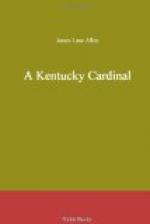Returning home late, I went at once to the tree, where I found not a quart of cherries, and the servants told of an astonishing thing: that no sooner had the birds discovered who was standing in the tree, wearing the clothes in which he used to feed them during the winter, than the news spread like wildfire to the effect that he had climbed up there and was calling out: “Here is the best tree, fellows! Pitch in and help yourselves!” So that the like of the chattering and fetching away was never seen before. This was the story; but little negroes love cherries, and it is not incredible that the American birds were assisted in this instance by a large family of fat young African spoon-bills.
Anxious to save another tree, and afraid to use more of my own clothes, I went over to Mrs. Walters, and got from her an old bonnet and veil, a dress and cape, and a pair of her cast-off yellow gaiters. These garments I strung together and prepared to look life-like, as nearly as a stuffing of hay would meet the inner requirements of the case. I them seated the dread apparition in the fork of a limb, and awaited results. The first thief was an old jay, who flew towards the tree with his head turned to one side to see whether any one was overtaking him. But scarcely had he alighted when he uttered a scream of horror that was sickening to hear, and dropped on the grass beneath, after which he took himself off with a silence and speed that would have done credit to a passenger-pigeon. That tree was rather avoided for some days, or it may have been let alone merely because others were ripening; so that Mrs. Cobb got her cherries, and I sent Mrs. Walter some also for the excellent loan of her veil and gaiters.
As the days pass I fall in love with Sylvia, who has been persuaded to turn my arbor into a reading-room, and is often to be found there of mornings with one of Sir Walter’s novels. Sometimes I leave her alone, sometimes lie on the bench facing her, while she reads aloud, or, tiring, prattles. Little half-fledged spirit, to whom the yard is the earth and June eternity, but who peeps over the edge of the nest at the chivalry of the ages, and fancies that she knows the world. The other day, as we were talking, she tapped the edge of her Ivanhoe with a slate-pencil—for she is also studying the Greatest Common Divisor—and said, warningly, “You must not make epigrams; for if you succeeded you would be brilliant, and everything brilliant is tiresome.”
“Who is your authority for that epigram, Miss Sylvia?” I said, laughing.
“Don’t you suppose that I have any ideas but what I get from books?”
“You may have all wisdom, but those sayings proceed only from experience.”
“I have my intuitions; they are better than experience.”
“If you keep on, you will be making epigrams presently, and then I shall find you tiresome, and go away.”
“You couldn’t. I am your guest. How unconventional I am to come over and sit in your arbor! But it is Georgiana’s fault.”




